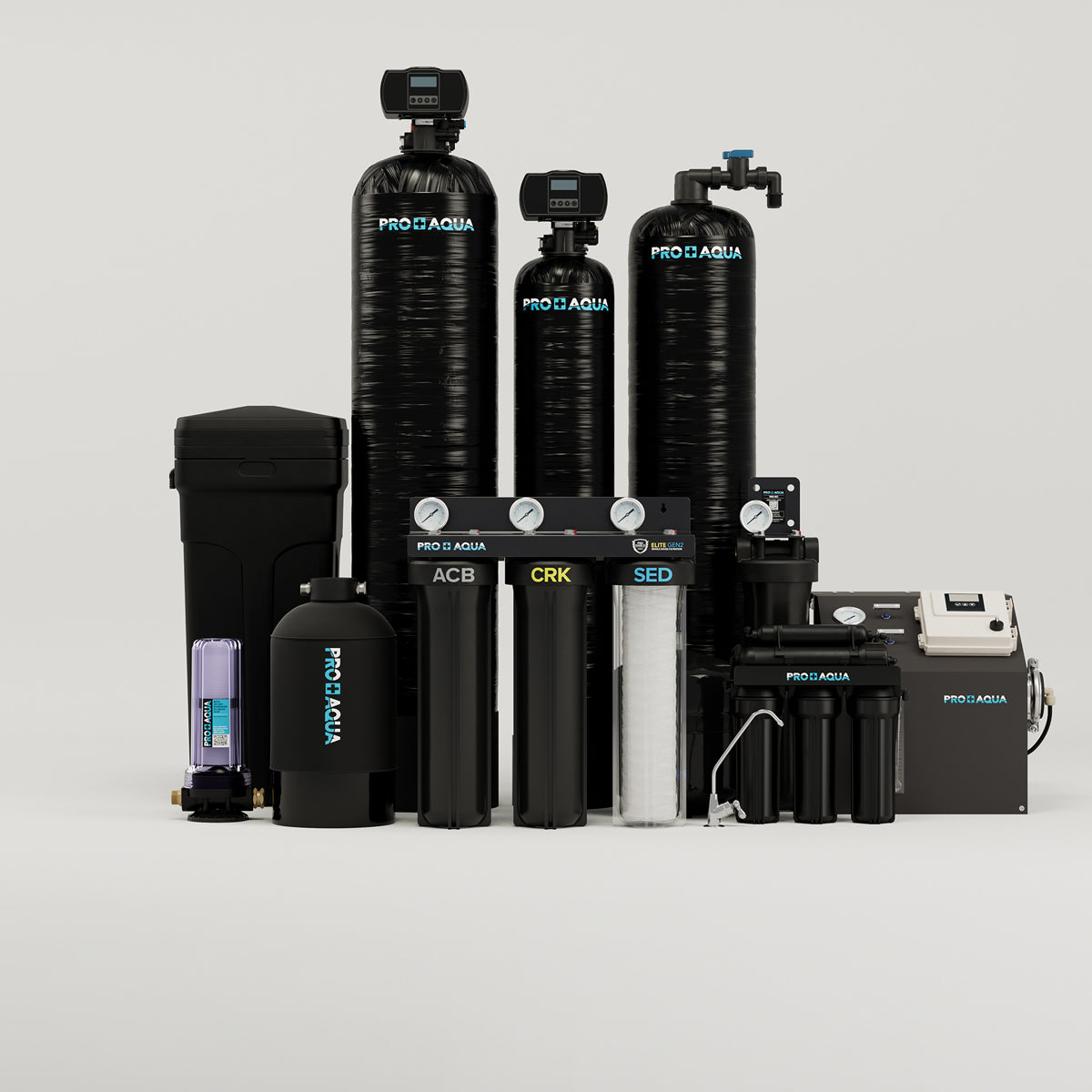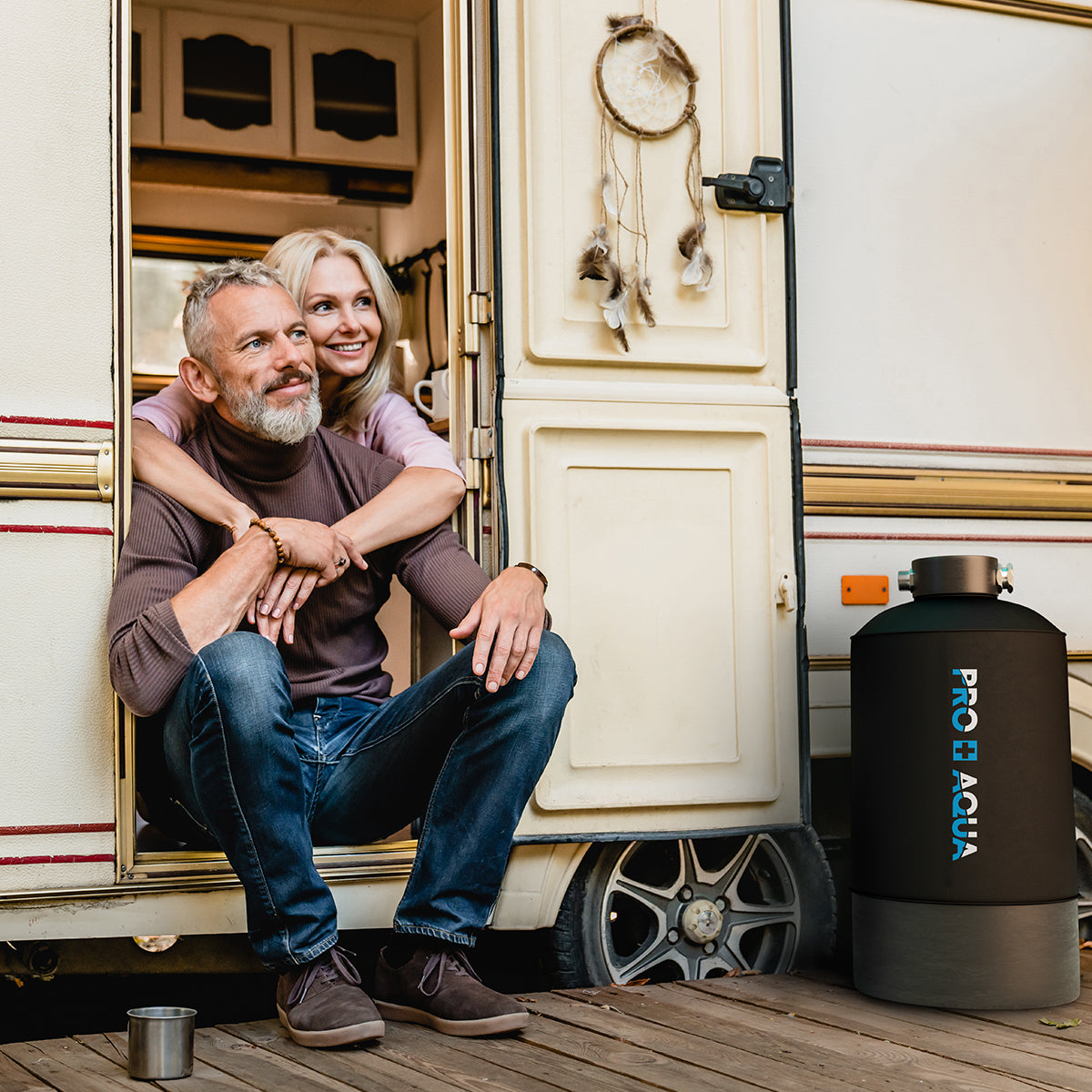If you’ve been battling persistent breakouts, dryness, or irritation, the issue might not be your products or habits. It could be your water—specifically, hard water.
Hard water can contribute to skin issues like acne, dryness, and irritation. But understanding the effects of hard water on skin requires some insight.
Here's what to know if you’re dealing with hard water skin issues or wondering why your skin feels dry after washing.
How Hard Water Affects Your Skin
Hard water is water that contains high levels of dissolved minerals—mainly calcium and magnesium. While these minerals aren’t harmful to drink, they can have unwanted effects on your skin.
1. It Disrupts the Skin’s Natural Barrier
Healthy skin relies on a balanced acid mantle, which is the natural barrier that protects your skin. Hard water can throw off your skin’s pH, weakening this barrier and leaving your skin more prone to irritation and breakouts.
2. Mineral Residue Can Clog Pores
When hard water and facial cleansers mix, they create a chemical reaction that forms insoluble compounds (soap scum). This creates a residue of film on your skin that can clog pores, contributing to hard water acne.
3. It Makes Cleansers Less Effective
Hard water reduces the effectiveness of cleansers and soaps, making it harder to remove dirt, oil, and bacteria. As a result, you may feel the need to scrub harder or use more product—both of which can worsen skin irritation and acne.
4. It Dries Out the Skin
One of the most common effects of hard water on skin is dryness. Without a proper cleanse and rinse, your skin may feel tight or flaky. And when your skin dries out, it can overproduce oil to compensate—leading to breakouts.
Dermatologist Dr. Dennis Gross notes that “hard water can strip the skin of natural oils, leading to inflammation and breakouts,” especially for those with sensitive skin.

Can Hard Water Really Cause Breakouts?
Hard water doesn't exactly cause direct acne, but it does create conditions for skin issues to occur.
When hard water dries out your skin and clogs your pores, it can trigger or worsen breakouts. This is especially true for people already prone to acne, rosacea, or dermatitis.
Studies have found that hard water areas are more likely to experience eczema and other inflammatory skin conditions. So while hard water may not be the root cause, it can certainly be an aggravating factor.
The problem may be even more pronounced with well water. Well water is often harder than city water and may contain additional impurities.
Can Soft Water Cause Breakouts?
With all the concerns about hard water, you might wonder: Can soft water cause breakouts too?
Generally, soft water is gentler on your skin. It lathers more easily with soap, rinses cleanly, and helps preserve your skin’s natural moisture. However, in rare cases, some people may notice changes in oil production as their skin adjusts to soft water. This usually happens if they’ve been over-cleansing to compensate for hard water before.
That said, it's unlikely that soft water causes acne. In most cases, switching to soft water helps reduce breakouts, irritation, and dryness—not cause them.
Common Signs Your Skin Might Be Reacting to Hard Water
Here are some symptoms of hard water on skin to watch for:
- Tightness or dryness after washing
- Persistent breakouts, especially along the jawline or cheeks
- Itchy, red, or inflamed skin
- Residual film on your face, hair, or shower tiles
- Hard water rash or worsening of conditions like eczema or dermatitis
If these signs sound familiar, you might be dealing with hard water skin irritation or even a skin rash from hard water.

What You Can Do About It
Luckily, a variety of solutions exist for hard water-causing acne.
1. Install a Water Softener
A water softener system removes calcium and magnesium from your water supply, helping prevent dry skin from hard water. This is the most effective long-term solution for improving hard water effect on skin.
For homes on well water, softening is even more important, as well water can contain additional minerals and contaminants.
2. Use the Right Skincare Products
Look for products labeled as:
- pH-balanced
- Hydrating (think hyaluronic acid or ceramides)
- Non-comedogenic (won’t clog pores)
- Soap-free and gentle
The best face wash for hard water depends on your individual skin type and won't be the same for everyone.
3. Rinse With Filtered or Micellar Water
If you’re not ready for a whole-home softener, consider using filtered water or micellar water as a final rinse on your face.
4. Consult a Dermatologist
If you’ve tried everything and still suffer from hard water skin rash or breakouts, it’s worth speaking with a dermatologist. They can help tailor treatments or confirm if your water is affecting your skin.
Best Water Softeners to Protect Your Skin
If you’re ready to take action against the effects of hard water on your skin, investing in a high-quality water softener is the best place to start. Whether you're at home, on the road, or looking for a salt-free option, here are top-rated solutions to help protect your skin and prevent hard water breakouts.

|
Category |
|||
|
Ideal For |
Large homes, well water users |
Homes seeking a salt-free alternative |
RV users, mobile homes, travelers |
|
Softening Type |
Salt-based ion exchange |
Salt-free conditioner |
Salt-based ion exchange |
|
Key Benefits |
Removes calcium/magnesium, full-home coverage |
No salt or electricity required |
Compact, travel-ready, protects skin and gear |
|
Best For Skin |
Maximum protection from dry, irritated skin |
Gentle conditioning, chemical-free approach |
Prevents dryness and breakouts while traveling |
|
Grain Capacity |
80,000 grains |
N/A (Salt-free system) |
16,000 grains |
Conclusion: Protecting Your Skin from What’s in Your Water
From breakouts to dryness, itchiness, and even rashes, hard water can quietly sabotage your skin.
By recognizing the signs and considering a water softening solution, you can restore your skin’s health and balance.
If you're wondering if it's time to switch from hard water to soft water, we’re here to help. Investing in soft water could be the first step to clearer, healthier skin.







Leave a comment
This site is protected by hCaptcha and the hCaptcha Privacy Policy and Terms of Service apply.